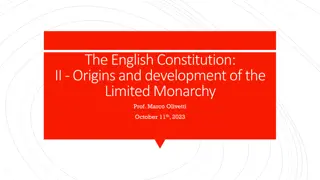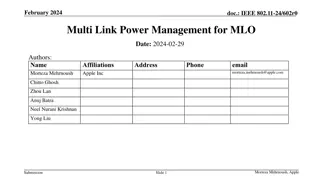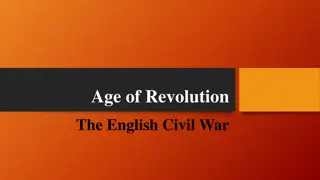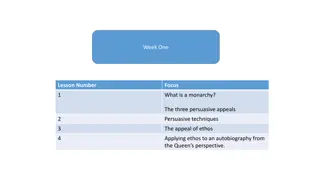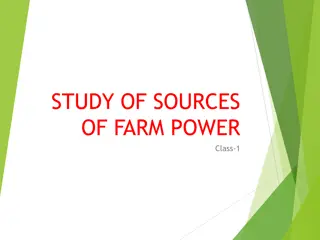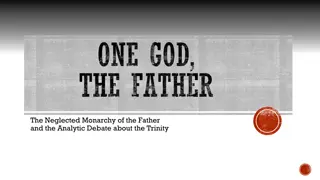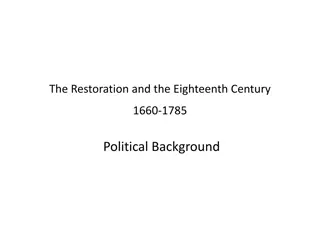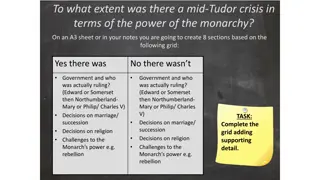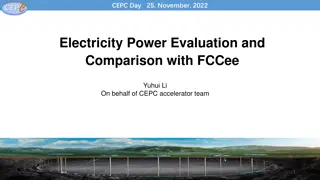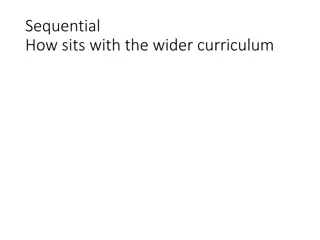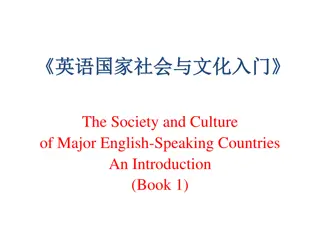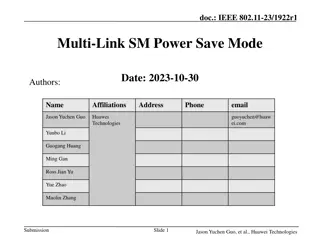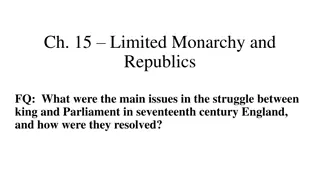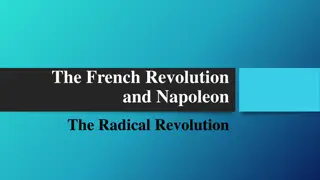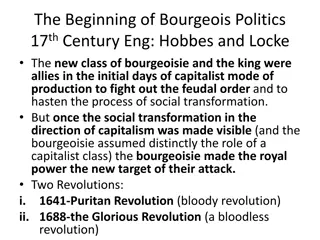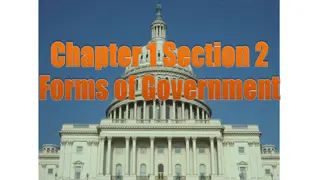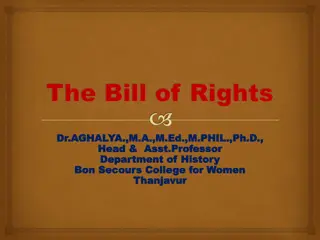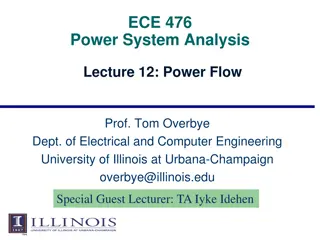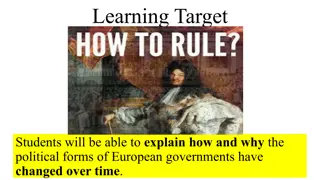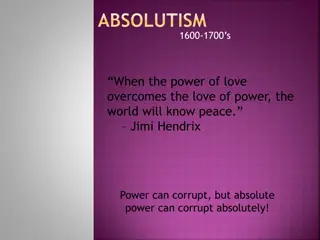Cisco Systems Fault Managed Power Portfolio Overview
Cisco Systems offers an industry-leading Fault Managed Power (FMP) patent portfolio comprising 24 active assets across seven INPADOC families. The portfolio includes patents supporting fault-managed power systems, PoE deployments, DC power distribution, DC-DC conversion, and HVDC connectors. The FMP
4 views • 4 slides
Evolution of Limited Monarchy in English Constitution
The development of limited monarchy in the English Constitution is traced from Anglo-Saxon Britain through the introduction of feudalism. This system of governance established a complex relationship between the king, lords, and vassals, leading to the formation of the King's Council and the origins
0 views • 19 slides
Improving Multi-Link Power Management Efficiency in IEEE 802.11 Networks
The document discusses challenges with per-link power mode changes in multi-link scenarios in IEEE 802.11 networks, proposing a solution for more efficient power management. It addresses issues such as latency and inefficiencies in signaling for power mode changes, introducing scheduled multi-link p
6 views • 9 slides
Understanding Power Transfer and Impedance Matching in Circuits
Exploring the concept of maximizing power transfer between a source and load through impedance matching. Learn about complex conjugates, real and magnitude of complex numbers, average power in circuits, and the importance of minimizing reflected power. Discover how incident, reflected, and delivered
3 views • 33 slides
The English Civil War and the Rise of the Stuart Dynasty
The English Civil War marked the end of the Tudor dynasty and the rise of the Stuart Dynasty in England. It was a time of conflict between the monarchy and Parliament, with issues revolving around divine right, religion, and political power. Leaders like James I and Charles I faced opposition from P
0 views • 13 slides
Understanding Monarchy: A Study in Persuasive Appeals
Introduction to the concept of monarchy as a form of government and its various manifestations, exploring persuasive appeals and the application of ethos through the perspective of a queen. The content delves into the role of a monarchy in modern society and encourages critical analysis through tran
10 views • 18 slides
Overview of Farm Power Sources and Utilization in Agriculture
Farm power sources in agriculture include human, animal, mechanical, and renewable energy. Human power is costly but versatile, while animal power is traditional and provides manure. Mechanical power from tractors and engines is efficient. India's farm power sources reflect a mix of traditional and
0 views • 12 slides
The Puritan Legacy & The Commonwealth 1625-1675: A Historical Overview
The era between 1625-1675 is known as The Puritan Legacy & The Commonwealth, characterized by a Puritan movement seeking moral and political reform. This period saw conflict, the rise of Puritan standards, beheading of Charles I, and the establishment of the Commonwealth under Cromwell. The Puritans
2 views • 21 slides
Analyzing the Neglected Monarchy of the Father in Trinitarian Debate
Exploring the Monarchy of the Father doctrine and its implications on the Trinitarian debate, this analysis delves into historical context, objections, and influential alternatives like Biblical Unitarianism, shedding light on how reevaluating traditional definitions can reshape theological discussi
0 views • 67 slides
Understanding Power Quality and Its Impact on Electrical Systems
Power quality refers to the characteristics of electrical power that drives sensitive equipment. It involves voltage and current deviations from ideal waveforms, impacting the efficiency and reliability of electrical systems. Various types of power quality phenomena exist, such as voltage variations
1 views • 16 slides
Understanding the British Governmental System and Monarchy
Explore the British governmental system and monarchy with insights into the House of Parliament, House of Lords, House of Commons, Buckingham Palace, and the Royal Flag. Discover the roles and functions of key institutions in the UK's political framework.
0 views • 13 slides
England in the Restoration and Eighteenth Century: Political Evolution and Social Transition
Following years of civil wars and revolution, England saw significant political shifts from the Restoration period in the 1660s to the Eighteenth Century. The monarchy was restored, leading to the emergence of Whig and Tory political factions, battles for religious dominance, and the growth of Briti
2 views • 14 slides
Understanding Different Forms of Government
An institution known as government establishes and enforces rules for a group of people. This institution must possess sovereignty, legitimacy, and jurisdiction. Various forms of government exist, such as dictatorship, absolute monarchy, and constitutional monarchy, each with distinct characteristic
0 views • 12 slides
Enlightenment Political Ideas in Modern France
The Enlightenment era in Modern France brought forth significant political ideas and discussions, including Thomas Hobbes' concept of social contract and Rousseau's emphasis on collective sovereignty. Montesquieu advocated for checks-and-balances in government, while Voltaire promoted enlightened ab
0 views • 21 slides
Helicopter Power Management Guidelines
Understanding the factors that can lead to power required exceeding power available in a helicopter is crucial for safe operation. Indications such as uncommanded descent, rotor droop, loss of tail rotor authority, and right yaw signal potential issues to watch out for. Knowing when such occurrences
0 views • 11 slides
Exploring Power Efficiency in Computing Systems
In this lecture series on energy-efficient computing, various concepts related to dynamic frequency scaling, power capping, power shifting, power modeling, and power measurement are discussed. The impact of power on server speed is explored, alongside strategies for improving performance within powe
0 views • 17 slides
Examination of the Mid-Tudor Crisis: Power Struggles and Challenges to Monarchy
The mid-Tudor era witnessed a crisis in the power of the monarchy, as evident through issues of government authority, decisions on marriage and succession, religious policy, and challenges to royal power. The complexities of ruling under Edward VI, Mary I, and their advisors, along with crucial even
0 views • 16 slides
Comparison of Electricity Power Systems Between CEPC and FCCee
The evaluation and comparison of electricity power systems between the CEPC and FCCee accelerators reveal the power breakdowns, RF power consumption, magnet power supply, and overall power usage. Differences in power consumption for various components such as RF, magnets, and vacuum systems are high
0 views • 19 slides
Understanding Thomas Hobbes' Leviathan: State of Nature, Natural Laws, and Commonwealth
Thomas Hobbes explores the state of nature, natural laws, and the formation of the commonwealth in his work Leviathan. He discusses the equality of men, causes of conflict in the state of nature, and the transition out of this chaotic state towards civil society under a monarchy. According to Hobbes
0 views • 15 slides
Power Quality Monitoring and Evaluation in Modern Energy Systems
Power quality is crucial for stable operations in energy systems. This content discusses issues in power supply, reasons for measuring power quality, consequences of bad power quality, methods for measuring power quality, and evaluation techniques for compliance reports. Tracking power quality param
0 views • 21 slides
Rise of Mussolini in Italy and Weaknesses of the Liberal Monarchy
The historical timeline of Italy before 1919 led to Mussolini's rise to power through various events such as his involvement with the Italian Socialist Party and the formation of the Fascio di Combattimento. Italy's Liberal Monarchy faced weaknesses, including political divisions between progressive
0 views • 35 slides
Exploring Changes Through British Monarchs
Delve into how Britain has evolved under different kings and queens, from Queen Victoria to Queen Elizabeth. The national curriculum requirements for KS1 and KS2 focus on significant individuals in history and the changing power of monarchs post-1066. Students will learn about coronations, lifestyle
0 views • 5 slides
The Government and Monarchy of the United Kingdom: A Historical Overview
Explore the rich history of the United Kingdom's government and monarchy, from the ancient institution of the Monarchy and the role of the Prime Minister to significant events like Magna Carta and the Civil War. Discover the development of Parliament, the birth of the Prime Minister, the roles of th
0 views • 28 slides
Power Dynamics in the Hellenistic World: A Study of Olympias of Macedon
Exploration of power dynamics in the Hellenistic world through the multidimensional exercise of power by Olympias of Macedon. The study delves into various forms of power such as reward, coercive, legitimate, referent, and expert power, shedding light on their roles in shaping leadership and influen
0 views • 20 slides
Enhancing Power Efficiency in IEEE 802.11 Multi-Link SM Power Save Mode
The document discusses how Multi-Link Operation (MLO) in IEEE 802.11be can improve throughput and reduce latency but may increase power consumption for non-AP devices. It introduces the concept of Multi-Link SM Power Save mode to optimize power usage by activating multiple links only when necessary,
0 views • 10 slides
Stories from 1 & 2 Samuel: Kings, Prophets, and Kingdoms
Explore the captivating tales from the books of 1 and 2 Samuel in the Hebrew Bible. Delve into the rejection of King Saul, David's triumph over Goliath, and the intricacies of David's reign, including his encounter with Bathsheba. Witness the rise of the Kingdom of Israel, from the period of judges
0 views • 16 slides
Struggle Between King and Parliament in Seventeenth Century England
The seventeenth century in England witnessed a tumultuous struggle between the king and Parliament, revolving around issues such as royal authority, taxation, and religious policies. This conflict culminated in events like the Petition of Right, Charles I's personal rule, and the limitations imposed
0 views • 12 slides
The Radical Phase of the French Revolution: Abolishing the Monarchy
The French Revolution entered its Radical Phase in 1793, marked by violent events such as the abolition of the monarchy, execution of King Louis XVI, establishment of the French Republic, and the subsequent Reign of Terror. Tensions rose as war broke out with various countries, leading to internal c
0 views • 19 slides
The Evolution of Bourgeois Politics in 17th Century England: Insights from Hobbes and Locke
The emergence of bourgeois politics in 17th century England marked a significant shift in power dynamics as capitalism began to take hold. The bourgeoisie initially allied with the monarchy to overthrow the feudal order but later turned against the royal power. The Puritan Revolution and the Gloriou
0 views • 20 slides
Overview of Unified Power Flow Controller (UPFC) in Power Systems
A Unified Power Flow Controller (UPFC) is a combination of a Static Synchronous Compensator (STATCOM) and a Static Synchronous Series Compensator (SSSC) interconnected via a common DC link. UPFC allows bidirectional flow of real power and provides concurrent real and reactive series line compensatio
0 views • 20 slides
Understanding Leadership and Power Dynamics
Power and leadership are interconnected concepts, with power being the measure of a person's ability to influence others. Leaders have power in various situations, but it does not necessarily mean having power over people. Effective leaders balance their use of power with knowledge and trust, knowin
0 views • 9 slides
Overview of Different Types of Governments and Their Classifications
Governments vary in structure and features, with classifications based on key characteristics like the concentration of power, participation in governance, and the relationship between branches. This overview covers various government types such as autocracy, democracy, oligarchy, and monarchy, high
0 views • 15 slides
The English Bill of Rights: Definition and Impact
The 1689 English Bill of Rights was a pivotal British law passed after the Glorious Revolution of 1688. It outlined the rights and liberties of people, limiting the monarchy's power and establishing a constitutional monarchy in Great Britain. The Bill influenced constitutional developments in North
0 views • 10 slides
Power System Analysis: Lecture on Power Flow
Lecture 12 on Power Flow Analysis in Power Systems covers the use of power balance equations when analyzing complex power consumption and generation. It explains the derivation of real power balance equations for iterative solutions in power flow analysis. The lecture highlights the need for iterati
0 views • 30 slides
Political Evolution of Nepal: From Monarchy to Republic
Explore the political history of Nepal from the days of monarchy to the establishment of a republic. Learn about the key players, structures, and societal makeup that have shaped the country's journey towards democracy and governance.
0 views • 11 slides
Overview of the Old Regime and the French Revolution
The Old Regime in France before the French Revolution was marked by a hierarchical society divided into privileged and unprivileged classes. The monarchy held absolute power under the Divine Right of Kings, leading to economic hardships and discontent among the populace. King Louis XVI's lavish spen
0 views • 18 slides
Evolution of European Governments: Historical Changes and Challenges
Explore the transformation of European governments through key events like the English Civil War, Glorious Revolution, struggles in Poland between monarchy and nobility, and characteristics of the Dutch Republic during its Golden Age. Uncover the shifts in political forms as monarchies evolved and r
0 views • 25 slides
The Monarchy in England: From Restoration to Revolution
The content discusses the Restoration of the monarchy in England, the reign of Charles II, the formation of political parties Whigs and Tories, the rise of the Whigs, James II's absolutist aims, and the Glorious Revolution leading to the Bill of Rights in 1689 limiting the monarch's power.
0 views • 8 slides
Understanding Different Forms of Government
Exploring various types of government, from monarchy to democracy, and discussing the roles and structures that define each system. Discover insights into absolute monarchy, constitutional monarchy, and more, shedding light on the diverse ways societies are governed.
0 views • 20 slides
Rise and Fall of Absolutism: A Glimpse into 17th-Century Monarchy
Explore the era of Absolutism (1600-1700s) where rulers wielded absolute power, influenced by divine right beliefs. Focusing on Louis XIV of France, known as the Sun King, who shaped France's destiny through extravagant projects like the Palace of Versailles. However, challenges to absolute rule eme
0 views • 17 slides

